Male fertility increasing foods have been rising in popularity over recent years – gone are the days when fertility diets are just for women. When you’re preparing for conception, it’s not just women’s health that matters.
While some foods can increase sperm count, other foods can harm sperm quality and quantity. What is a low sperm count? If a male has less than 39 million sperm per ejaculation, it’s considered a low sperm count. This sounds like a lot, but it’s not!
Reevaluating your partner’s diet can greatly improve your chances of getting pregnant, and it’s not as difficult as you might think.
Did you know that sperm can take an average of between 72-76 days to develop and mature prior to ejaculation? If you’re trying to conceive, either naturally or using IVF, then I recommend making some simple changes as soon as you can.
Here are 5 male fertility increasing foods that men can add to their diets when trying to conceive:
1. Oranges
Vitamin C can improve the motility of sperm and well as increasing sperm count. Other foods that contain high levels of vitamin C are broccoli, tomatoes and cauliflower. If you struggle to add enough vitamin C to your plate, a morning smoothie can be a great way to incorporate vitamin C -rich foods into your day, without having to chomp on leafy greens at every meal!
2. A Mediterranean Diet
This means more fruit and vegetables, good quality olive oil and plenty of fish. The omega-3 fatty acids found in fish can help improve quality and quantity of sperm. Tuna, sardines and salmon are high in these fatty acids, as well as mackerel, which has 4,107 mg of omega-3 per serving.
3. Healthy Fats
Say no to trans fats, especially if you’re aiming to conceive. Trans fats include microwave popcorn, frozen pizza, donuts and fried chicken. Polyunsaturated fats such as omega-3 and omega-6 are crucial to help develop healthy sperm. Foods with high amounts of polyunsaturated fats include flax seeds, walnuts and sunflower seeds.
4. Organic Wholefoods
I always recommend that couples should have as many organic, wholefoods in their diet as possible. What are wholefoods? Wholefoods are a great male fertility increasing option and include whole grains, nuts, legumes, fruit and vegetables. When thinking about the food plan for the week, try and include a rainbow of colour when choosing your fruit and veg. This will give you a variety of nutrients your body is no doubt craving.
5. Dark Chocolate
It’s not just about oranges and Brussels sprouts…! Dark chocolate contains arginine (an amino acid) which can improve the quality of sperm. Raw protein balls can be a good way to eat dark chocolate – especially when combined with nuts and seeds for a double-whammy!
Finally…
The 3-4-month preconception period is the perfect time to incorporate these male fertility increasing foods, and a great chance to review other life habits. Upping your water intake, for example, can improve your seminal fluid and help flush unwanted toxins out of your body.
If you suspect infertility is an issue for you and your partner, it’s important to seek advice from a trained professional, as there are often other issues at play. Low libido, low testosterone levels and erectile dysfunction can all hinder your chances of conceiving naturally, and should be investigated. Infertility can be caused by genetics, disease and medications, as well as poor general health and wellbeing.
I recommend exercising regularly along with these simple diet changes. Recent studies have shown that men who exercise regularly can have better semen quality than those who are inactive. So get moving!
Not one specific food is the magic bullet to increase male fertility, but incorporating the above changes into your diet, as well as avoiding smoking, excess alcohol consumption and an inactive lifestyle, can be the key to conception.
I am pleased to announce that my blog has been featured in Feedspot’s Top 10 Australian Pregnancy Blogs of 2020. Thanks Feedspot!
I am an experienced pregnancy naturopath based in Brunswick, Melbourne. Please call 03 9380 8099 to make an appointment or visit Brunswick Health’s website to find out more information about the services I offer.

